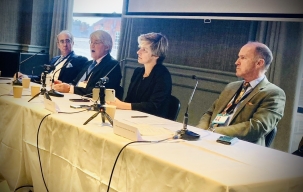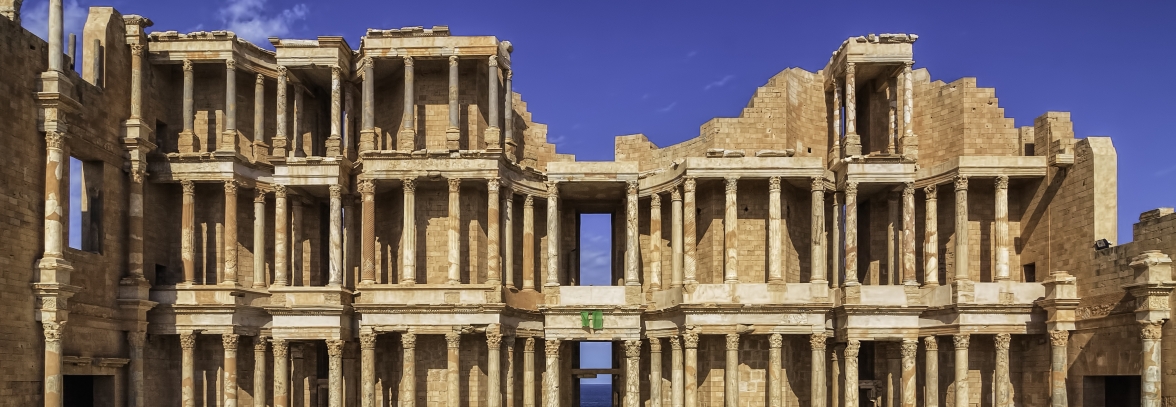Key dates
Latest
-
PodcastsDefence & Security — 2 Oct 2024
Podcast: CMEC at CPC24 pt.2: Does 'Stop The Boats' start in the Sahel?


Tripoli
6.4 million
Interim Government of National Unity
Position currently vacant - presidential elections were postponed in December 2021 and have yet to take place
Mr Abdul Hamid Dbeibeh - prime minister of the Government of National Unity - based in Tripoli
Mr Fathi Bashagha, interim prime minister of the Government of National Stability. Appointed by House of Representatives in Marc 2022. Based in Misrata and Tobruk
December 24th
Mr Khaled Jweda
Embassy of Libya, 15 Knightsbridge, London, SW1X 7LY
H.E Dr Martin Longden CMG OBE
British Embassy, 24th Floor, Tripoli Towers (formerly Bourj al-Fateh) Tripoli Libya
The British Embassy Tripoli does not provide consular services.
If you are in Libya, you can contact the British Embassy Tunis: The British Embassy Tunis, Rue du Lac Windermere, Les Berges du Lac, Tunis, 1053, Tunisia (Re-opened June 2022.)
Libya is mostly a desert and oil-rich country with an ancient history that encompasses the Phoenicians, Greeks and Romans. In the 7th century, the Arabs seized Libya and spread Islam throughout the region and, almost a thousand years later, the country was absorbed into the Ottoman Empire.
Italian colony and resistance
In 1911, Italy seized Libya from the Ottomans, leading to a 20-year insurgency in eastern Libya led by resistance leader and former teacher, Omar al-Mukhtar, "The Lion of the Desert". He was captured by the Italians in September 1931 and promptly hanged in front of his followers at the age of 73. He remains a national hero to Libyans.
Italy ejected
An increasingly brutal 30-year occupation by Italy ended with Mussolini’s ejection from Libya by the Allies in World War II.
In 1951, Libya gained independence under King Idris al-Sanusi, who had been a resistance leader against the Italians. The King was deposed in 1969 in a bloodless coup led by a 27-year-old army officer called Muammar Gaddafi.
At first he was known as Chairman of the Libyan of the Arab Republic and, from 1977 onwards, as the "Brotherly Leader" of "the Great Socialist People's Republic of the Jamahiriya".
Gaddafi was originally wedded to theories of Arab nationalism and socialism before developing his own "Third International Theory". The "Theory" - a mixture of African nationalism, Islamic socialism and various utopian ideals - were expounded in Gaddafi's "Green Book", which became compulsory reading for schools.
International pariahdom
Over the years, the international community observed Gaddafi's increasingly erratic behaviour with alarm. A number of tragic incidents led Gaddafi down the path towards international pariahdom. In 1984, a British woman police officer was murdered in London by a gunman from inside the Libyan Embassy.
Tripoli was blamed for the bombing of a Berlin nightclub in April 1986 which killed 3 people and injured 1oos more. 9 days later, the US launched retaliatory airstrikes against Tripoli and Benghazi. Gaddafi's adopted daughter was said to be among those killed.
Lockerbie
Above all, it was the bombing of a Pan Am airliner over the small Scottish town of Lockerbie in December 1988 which really saw Gaddafi ostracised by the international community. 243 passengers and 16 crew died in the disaster.
In November 1991, the FBI and the Dumfries and Galloway Constabulary issued arrest warrants for 2 Libyan suspects, including an intelligence officer called Abdelbaset Ali al-Megrahi.
UN Sanctions
In 1992, the UN imposed sanctions on Libya over the bombing. In 2001, a special Scottish court found al-Megrahi, guilty and sentenced him to life imprisonment. In 2003, Libya signed a deal worth $2.7 billion to compensate families of the Lockerbie victims. In 2009, al-Megrahi was freed from jail in Scotland and returned to Libya where he was greeted as a hero.
In 2004, Libya wrote a note to the UN Security Council in which it took responsibility for the bombing. Later that year, the UN lifted sanctions which it had imposed on Libya. A year later, Libya paid $35 million to compensate victims and their families for the bombing of a Berlin nightclub in 1986.
Briefly in from out of the cold
The 2000s saw something of a rapprochement between the one-time pariah Gaddafi and the West. In 2004, Gaddafi received a visit from the then British prime minister Tony Blair and even signed an immigration agreement with the EU. In 2009, the colonel paid an official visit to Libya's one-time colonial masters, Italy, which became Tripoli's main trading partner.
Revolution and civil war
Civil war broke out in February 2011 following violently suppressed protests in the eastern city of Benghazi. In March 2011, the UN Security Council authorised a no-fly zone over Libya, as well as air strikes to protect civilians and rebel militias. NATO assumed control of the air operation that proved decisive in the eventual defeat, and death, of Gaddafi in October 2011.
Chaos and intermittent conflict followed in Libya over the next decade, as various militias vied for control of this huge country. In 2014, the Islamic State group also became active in Libya, occupying the coastal cities of Sirte and Derna, east of Benghazi. The group also launched a 3-year campaign to take Benghazi, which ultimately failed.
Libya's 2nd civil war
Chaos followed the fall of Gaddafi. Competing militias ruled the roost in Libya and took sides with 2 competing administrations during Libya's 2nd Civil War which broke out in 2014 and would last another 6 years. Islamist militias, including the Islamic State group/Daesh and Ansar al Sharia, took advantage of the mayhem to seize key towns and territory.
In late 2013, the Tripoli-based General National Council (GNC), a provisional government which supposedly had authority in Libya after Gaddafi, voted to extend its power by another year. Initially, the GNC accepted the results of elections to Libya's new House of Representatives - held in June 2014 - but rejected the results later. The GNC pointed to the decision of Libya's Supreme Court that nullified an amendment relating to the roadmap for Libya's transition. This also nullified the HoR election results.
Armed Islamist militias took control of the capital Tripoli while the House of Representatives moved to the port city of Tobruk, almost 800 miles along the Libyan coast to the east of Tripoli.
The rise of General Khalifa Haftar
The Spring of 2014 saw the start of the rise of ex-general Khalifa Haftar, regarded by his many detractors and western observers as a renegade and a warlord, and by his supporters as a strong leader leaded to forge unity . Haftar and his so-called "Libyan National Army" (LNA) took the side of the House of Representatives, and immediately launched a military assault against Islamist militias in Benghazi, 270 miles to the west of his Tobruk strong-hold. Haftar called his campaign "Operation Dignity".
In 2016, Haftar seized key control of the state oil company, as well important eastern oil terminals, including those at Ra's Lanuf and Brega. In 2017, he claimed to have taken over the city of Derna, which lies approximately 180 miles to the east of Benghazi. He also announced victory over the islamist militias of Benghazi.
In April 2019, Haftar began his determined but ultimately doomed assault on western Libya and the capital, Tripoli, "Operation Flood of Dignity". His attack led to many civilian deaths.
The UN-backed Government of National Accord drove Haftar from Tripoli as well the nearby city of Tarhouna, which was the general's last western stronghold.
Haftar remains a controversial figure in Libya. To his supporters, he is a national hero who unified and led the fight fought against Islamist armed groups, including Ansar al-Sharia and the Libyan branch of the Muslim Brotherhood, as well the Islamic State group/Daesh.
To his critics, Haftar is a warlord and tyrant who rejected the UN-backed Government of National Accord in 2016 and committed war crimes and human rights abuses. He has announced his intention to stand for Libya's presidency in elections, whenever they are eventually held.
Government of National Accord
The Government of National Accord was a United Nations-led initiative to establish an acting government for Libya. It was signed into existence in December 2015 and first met in Tunis in January 2016. It struggled to assert any authority over the country or its warring militias and competing tribal interests. Its mandate expired in 2017- according to the Libyan Political Agreement under which it had been established and and signed by the UN and Parliament. But the GNA continued and went on to play a key role against Haftar and his Libyan National Army in the so-called Western Libyan Campaign of 2019.
Government of National Unity - a hope for peace and stability
In February 2021, the UN-convened Libyan Political Dialogue Forum elected a new "Government of National Unity." In March, Libya's House of Representatives formally approved the formation of the new GNU - to be based at Tripoli and led by Mohamed al-Menfi as Chairman of the Presidential Council of Libya.
The primary aims of the GNU, a provisional government, are to unify the Tripoli-based Government of National Accord with the Haftar-backed government based in Tobruk, and see Libya through to legislative elections at the end of the year.
Abdul Hamid Dbeibeh took over as the acting prime minister of the Government of National Unity in Tripoli.
However, in September 2021, the National Assembly voted to withdraw confidence in the GNU, causing further international concern about the prospects of a successful national election. Also the lives of ordinary Libyans, particularly in western Libya, continue to be blighted by the warring and activities of competing militias.
Troubled elections
UN-backed elections scheduled for December 24th 2021 were postponed at the last minute, with Libyan authorities citing "force majeur" (exceptional circumstances.) The main issues were the problems and instability caused by the candidates' list for the presidential race which included Haftar and Saif al-Islam Gaddafi, Gaddafi's son. Acting PM Dbeibeh also announced his candidature, despite assurances given by members of the interim government not to stand for election.
Renewed East-West rivalry, and chaos
Talks to re-schedule elections quickly floundered as renewed wrangling broke out between east and west. In February 2022, Dbeibeh narrowly escaped an assassination attempt when gunmen fired on his car. On February 10th 2022, the Tobruk House of Representatives (HoR) - inevitably with Haftar's backing - selected Fathi Bashagha as interim PM. Dbeibeh refused to had over power until after an election. On March 3rd 2022, Bashaga's rival administration was sworn in by the HoR.
